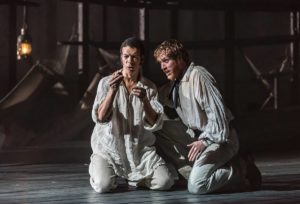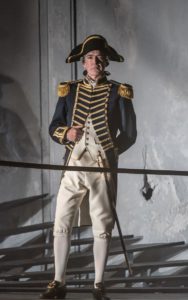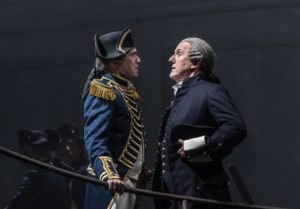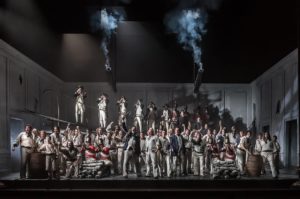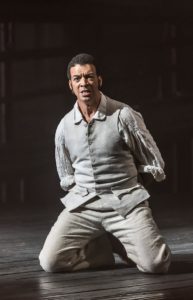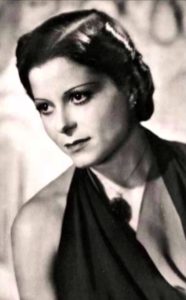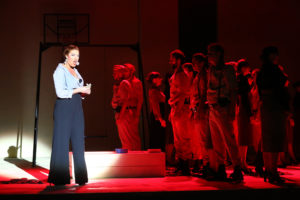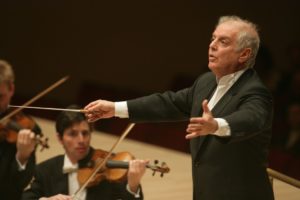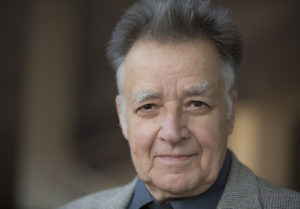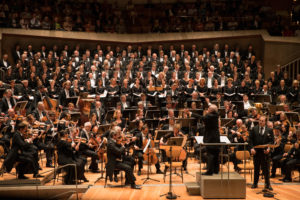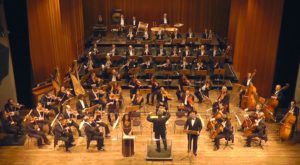War Kills Angels
Billy Budd is a painful opera. Shocking for ordinary people on the street who are not in a position to understand the attitude of Captain Vere, who, despite the apparent self-evidence of Budd’s innocence, upholds the court martial verdict upon the young sailor. Depressing to history lovers who are aware of the heartless discipline reigning on British ships of that time, especially in 1797 after the mutinies at the Spithead and Nore anchorages, which were suppressed in a bloody manner. And shocking for both Christians, forced to reflect yet again on the freedom of the choice between good and evil; and for atheists, driven by the pessimism of this tale into a truly metaphysical horror. People entangled in the gears of the powers that be, witnesses of war and violence, aggrieved children and authoritarian parents, people forced to rein in their own desires according to society’s oppressive commands will identify with the three characters of the drama around whom the plot revolves. But even so, everyone will leave the theatre disoriented, uncertain of their arguments, shaken to the core by the emptiness of all legal and customary norms.
Readers of Herman Melville’s novel, on the basis of which Edward Morgan Forster and Eric Crozier created the libretto for Britten’s opera, also find themselves in a similar bind. The American writer’s last work, published posthumously in 1924 and reinterpreted many times by literary critics, is in some measure an open text. Despite its conciseness, it makes use of symbolism equally as rich as that of the monumental Moby Dick – and after all, it gives rise to a similar dilemma of whether to read it as an ‘unbearable allegory’, or as a literal interpretation of the truth about human life. It does not have any unambiguous heroes. Claggart and Billy Budd – Evil incarnate and Good incarnate – are basically the obverse and reverse of the same medal. Both are equally inhuman in their perfection and corruption. Captain Vere – at first glance an imperturbable guardian of martial order – actually becomes involved in a conflict between the heart and reason, between cruel peace and destructive freedom. A conflict which he resolves only years later while reminiscing about the dramatic events on His Majesty’s ship. Both the novella’s plot and the opera’s narrative play out in a place from which there is no escape: a peculiar marine solitary confinement that triggers people’s most primitive instincts.
One of the more oft-discussed aspects of Billy Budd is the homosexual thread which, the opinions of some commentators notwithstanding, is present not only in the opera, but in the novella itself. Contemporary stage directors too hastily take it on faith that Forster and Britten purposely brought out this motif, ingeniously tangling it with other contexts of the work for, among other reasons, fear of the audience’s reaction in a country where a 16th-century law on sodomy was in force until 1967 – the only difference being that in 1861, the death penalty was replaced with a prison sentence. Personally, I will take a risk and state that homoeroticism emerges considerably more clearly from the pages of the novella because of, among other things, Melville’s peculiar language – from the episode where Billy accidentally spills soup at Claggart’s feet, to the expansive description of the convict’s execution, to the conversation between the ship’s surgeon and the purser, who comment upon its progress. In Britten’s opera, on the other hand, accents appear that are absent from the novella – for instances, the violent opposition of the butcher known as Red Whiskers to being conscripted into service on the ship. The two works are, however, linked by a certain immeasurably important characteristic: their narrative is equally unclear and disordered as Billy Budd’s speech. Melville and Britten are silent about certain matters; sometimes they nervously stutter, sometimes they speak to us in a language completely out of this world.
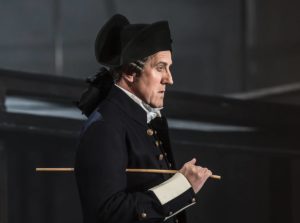
Alastair Miles as John Claggart. Photo: Clive Barda.
The creators of the new staging at Opera North in Leeds – stage director Orpha Phelan and stage/costume designer Leslie Travers – made a wise decision not to reveal the mystery enclosed in this text. The show begins in the proscenium, in an empty Classical salon with soiled walls, in which the aged Vere reminisces about the tragedy of 1797. At the end of the monologue, the main wall migrates upward, revealing another scraped-up room in which there is the vague skeleton of a ship, cobbled together from boards on several levels of the stage. Everything takes place in the captain’s home; it takes on the form of a hazy memory in which what comes into the foreground are living people, dressed in costumes clearly defining their character and status in the military hierarchy. On the captain’s bridge, Vere reigns in a uniform sparkling with gold; between the bridge, the deck and the crew’s quarters, Claggart circulates enveloped in black; the sweaty sailors are absorbed in their everyday grueling labor. The relationships between the characters begin slowly; the claustrophobic space reinforces an impression of tension. Any kind of intimacy – friendly digs exchanged by the deckhands, solicitous care for the Novice flogged to unconsciousness – is possible only among the ship’s plebs. The higher in the hierarchy one goes, the colder and more lonely it gets. The most tragic figure of alienation turns out to be Claggart himself: a person from nowhere, suspended midway between the haughty dignity of the officers’ corps and the scruffy ugliness of the rank-and-file crew members. When the beautiful Billy Budd comes on board – with a broad smile on his face, in a shirt whiter and with a kerchief redder than those on the necks of the other sailors – anxiety appears on the bridge; and in Claggart’s heart, hatred.
I have not seen a show with such a meticulously-chosen cast in a long time. Hidden in the proud and lofty captain (Alan Oke) was, at the same time, a kind of childlike fragility; and his tenor voice, tormented by guilt and bringing to mind intense associations with that of Peter Pears, developed slowly, up to a shocking culmination on the words ‘I am the messenger of death!’ The role of Billy Budd found an ideal performer in the person of Roderick Williams, gifted with a bright baritone voice, at ease in the upper registers, enchanting in its fluidity in long legato phrases. However, Williams created a character insufficiently broken on the inside: his kind-heartedness was too mundane; his stutter did not betray any torment; in the scene where he kills Claggart, the bestial fury that would make the sudden death of his cruel persecutor believable was absent. Of the three lead characters, the one that made the biggest impression on me was Claggart – in this role, Alastair Miles made use of his abundant experience in Verdi roles, but he endowed his character with a surprising tragic outline, closer to the dilemmas of King Philip than to the dark perfidy of the Grand Inquisitor. In the famous monologue from Act I (‘O Beauty, o handsomeness, goodness!’) he revealed such coloristic and expressive capacities of his velvety bass voice, supported by phenomenal acting technique, that my heart literally leaped into my throat. In this scene, Orpha Phelan decided on the only relatively clear homoerotic accent: Claggart tears the kerchief taken from Billy from his neck, and then alternatingly sobs over it and beats it with a rattan switch.
Roderick Williams as Billy Budd and Oliver Johnston as the Novice. Photo: Clive Barda.
Basically all of the soloists deserve a kind mention; I will content myself, however, with praise for the very young Oliver Johnson (the Novice), who sings in an extraordinarily clear tenor voice; Stephen Richardson (Dansker), the seasoned on-stage veteran and thereby all the more believable; and the superb David Llewelyn, who succeeded in creating a truly repulsive characterization of Squeak. The Opera North men’s and boys’ choir played the most suggestive collective protagonist of this tragedy that I have heard since the times of Hickox’s legendary recording with the London Symphony Choir and Orchestra (in the terrifying ‘Starry Vere, God Bless you!’ probably even more suggestive). I had already become convinced of the merits of the local orchestra in June during their performance of Mahler’s Symphony no. 8 at Town Hall. The ensemble, led this time by the deft and sure hand of Garry Walker, more than confirmed them in this hellishly difficult score. To this day, I have the ominous sounds of the woodwinds in Claggart’s Iago-like ‘credo’ and the overwhelming tumult of the brass in the scene of the unsuccessful attack on the French warship. The only weaker link turned out to be the flute, which ‘stumbled along’ in its dialogue with Budd in his final soliloquy ‘Look! Through the port comes the moonshine astray’ – fortunately, the lower strings completely recompensed me this disappointment.
Alan Oke as Captain Vere. Photo: Clive Barda.
However, I had to travel to Leeds and experience this opera live for the first time in order to fully appreciate the moment when Britten decided to bring time to a standstill, shut down the narrative and pay homage to Melville. The famous ‘Interview Chords’ – 34 chords oscillating around an F major harmonic triad, filling in the empty space between Vere’s acceptance of the sentence and the convict’s monologue – are an ideal musical equivalent of a memorable phrase from the novella: ‘Beyond the communication of the sentence, what took place at this interview was never known.’ At the back of the darkened stage, with their backs to the audience, Billy Budd and the captain sit motionless. The listener considers the verdict in his or her own conscience. He or she must decide what this opera is about. Love? The battle of good and evil? Fate? Reconciliation? Suffering? Resignation to the inevitable? All of the above? None of the above? So many questions and no answers forthcoming.
Translated by: Karol Thornton-Remiszewski

